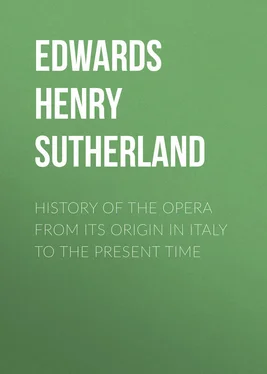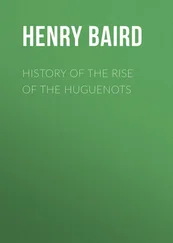Henry Edwards - History of the Opera from its Origin in Italy to the present Time
Здесь есть возможность читать онлайн «Henry Edwards - History of the Opera from its Origin in Italy to the present Time» — ознакомительный отрывок электронной книги совершенно бесплатно, а после прочтения отрывка купить полную версию. В некоторых случаях можно слушать аудио, скачать через торрент в формате fb2 и присутствует краткое содержание. Жанр: foreign_home, music_dancing, foreign_antique, foreign_prose, на английском языке. Описание произведения, (предисловие) а так же отзывы посетителей доступны на портале библиотеки ЛибКат.
- Название:History of the Opera from its Origin in Italy to the present Time
- Автор:
- Жанр:
- Год:неизвестен
- ISBN:нет данных
- Рейтинг книги:4 / 5. Голосов: 1
-
Избранное:Добавить в избранное
- Отзывы:
-
Ваша оценка:
- 80
- 1
- 2
- 3
- 4
- 5
History of the Opera from its Origin in Italy to the present Time: краткое содержание, описание и аннотация
Предлагаем к чтению аннотацию, описание, краткое содержание или предисловие (зависит от того, что написал сам автор книги «History of the Opera from its Origin in Italy to the present Time»). Если вы не нашли необходимую информацию о книге — напишите в комментариях, мы постараемся отыскать её.
History of the Opera from its Origin in Italy to the present Time — читать онлайн ознакомительный отрывок
Ниже представлен текст книги, разбитый по страницам. Система сохранения места последней прочитанной страницы, позволяет с удобством читать онлайн бесплатно книгу «History of the Opera from its Origin in Italy to the present Time», без необходимости каждый раз заново искать на чём Вы остановились. Поставьте закладку, и сможете в любой момент перейти на страницу, на которой закончили чтение.
Интервал:
Закладка:
"Guide me, lead me,
Where the nymph whom I adore
Poor Clayton seems, here and there, to have really fancied that it was his mission to put down Handel, and stuck to him for some time in most pertinacious style. One is reminded of the writer who endeavoured to turn Wilhelm Meister into ridicule, and of the epigram which that attempt suggested to Goethe, ending: —
"Hat doch die Wallfisch seine Laus."
But Clayton was really a creator, and proposed nothing less than "to revive an art which was running to ruin by the utmost barbarism under an affectation of knowledge." One would have thought that this was going a little too far. Handel affecting knowledge – Handel a barbarian? Surely Steele in giving the sanction of his name to such assertions as these, puts himself in a lower position even than Voltaire uttering his celebrated dictum about the genius of Shakespeare; for after all, Voltaire was the first Frenchman to discover any beauties in Shakespeare at all, and it was in defending him against the stupid prejudices of Laharpe that he made use of the unfortunate expression with which he has so often been reproached, and which he put forward in the form of a concession to his adversary.
Clayton and his second fiddles returned to the attack a few weeks afterwards (January 18th, 1712). "It is industriously insinuated," they complained, "that our intention is to destroy operas in general, but we beg of you (that is to say, the Spectator , as represented by Steele, who signs the number with his T) to insert this explanation of ourselves in your paper. Our purpose is only to improve our circumstances by improving the art which we profess" [the knaves are getting candid]. "We see it utterly destroyed at present, and as we were the persons who introduced operas, we think it a groundless imputation that we should set up against the Opera itself," &c., &c.
What became of Clayton, Haym, and Dieupart, and their speculation, I do not know, nor do I think that any one can care. At all events, even with the assistance of Steele and the Spectator they did not extinguish Handel.
The most celebrated vocalist at the theatre in the Haymarket, from the arrival of Handel in England until after the formation of the Royal Academy of Music, in 1720, was Anastasia Robinson, a contralto , who was remarkable as much for her graceful acting as for her expressive singing. She made her first appearance in a pasticcio called Creso , in 1714, and continued singing in the operas of Handel and other composers until 1724, when she contracted a private marriage with the Earl of Peterborough and retired from the stage. Lady Delany, an intimate friend of Lady Peterborough, communicated the following account of her marriage and the circumstances under which it was made, to Dr. Burney, who publishes it in his "History of Music."
"Mrs. Anastasia Robinson was of middling stature, not handsome, but of a pleasing, modest countenance, with large blue eyes. Her deportment was easy, unaffected, and graceful. Her manner and address very engaging, and her behaviour on all occasions that of a gentlewoman, with perfect propriety. She was not only liked by all her acquaintance, but loved and caressed by persons of the highest rank, with whom she appeared always equal, without assuming. Her father's house, in Golden Square was frequented by all the men of genius and refined taste of the times. Among the number of persons of distinction who frequented Mr. Robinson's house, and seemed to distinguish his daughter in a particular manner, were the Earl of Peterborough and General H – . The latter had shown a long attachment to her, and his attentions were so remarkable that they seemed more than the effects of common politeness; and as he was a very agreeable man, and in good circumstances, he was favourably received, not doubting but that his intentions were honourable. A declaration of a very contrary nature was treated with the contempt it deserved, though Mrs. Robinson was very much prepossessed in his favour.
"Soon after this, Lord Peterborough endeavoured to convince her of his partial regard for her; but, agreeable and artful as he was, she remained very much upon her guard, which rather increased than diminished his admiration and passion for her. Yet still his pride struggled with his inclination, for all this time she was engaged to sing in public, a circumstance very grievous to her; but, urged by the best of motives, she submitted to it, in order to assist her parents, whose fortune was much reduced by Mr. Robinson's loss of sight, which deprived him of the benefit of his profession as a painter.
"At length Lord Peterborough made his declaration to her on honourable terms. He found it would be in vain to make proposals on any other, and as he omitted no circumstance that could engage her esteem and gratitude, she accepted them. He earnestly requested her keeping it a secret till a more convenient time for him to make it known, to which she readily consented, having a perfect confidence in his honour.
"Mrs. A. Robinson had a sister, a very pretty accomplished woman, who married D'Arbuthnot's brother. After the death of Mr. Robinson, Lord Peterborough took a house near Fulham, in the neighbourhood of his own villa at Parson's-green, where he settled Mrs. Robinson and her mother. They never lived under the same roof, till the earl, being seized with a violent fit of illness, solicited her to attend him at Mount Bevis, near Southampton, which she refused with firmness, but upon condition that, though still denied to take his name, she might be permitted to wear her wedding-ring; to which, finding her inexorable, he at length consented.
"His haughty spirit was still reluctant to the making a declaration that would have done justice to so worthy a character as the person to whom he was now united; and indeed his uncontrollable temper and high opinion of his own actions made him a very awful husband, ill suited to Lady Peterborough's good sense, amiable temper, and delicate sentiments. She was a Roman Catholic, but never gave offence to those of a contrary opinion, though very strict in what she thought her duty. Her excellent principles and fortitude of mind supported her through many severe trials in her conjugal state. But at last he prevailed on himself to do her justice, instigated, it is supposed by his bad state of health, which obliged him to seek another climate, and she absolutely refused to go with him unless he declared his marriage. Her attendance on him in this illness nearly cost her her life.
"He appointed a day for all his nearest relations to meet him at the apartment over the gateway of St. James's palace, belonging to Mr. Poyntz, who was married to Lord Peterborough's niece, and at that time preceptor of Prince William, afterwards Duke of Cumberland. He also appointed Lady Peterborough to be there at the same time. When they were all assembled, he began a most eloquent oration, enumerating all the virtues and perfections of Mrs. A. Robinson, and the rectitude of her conduct during his long acquaintance with her, for which he acknowledged his great obligation and sincere attachment, declaring he was determined to do her that justice which he ought to have done long ago, which was presenting her to all his family as his wife. He spoke this harangue with so much energy, and in parts so pathetically, that Lady Peterborough, not being apprised of his intentions, was so affected that she fainted away in the midst of the company.
"After Lord Peterborough's death, she lived a very retired life, chiefly at Mount Bevis, and was seldom prevailed on to leave that habitation but by the Duchess of Portland, who was always happy to have her company at Bulstrode, when she could obtain it, and often visited her at her own house.
Читать дальшеИнтервал:
Закладка:
Похожие книги на «History of the Opera from its Origin in Italy to the present Time»
Представляем Вашему вниманию похожие книги на «History of the Opera from its Origin in Italy to the present Time» списком для выбора. Мы отобрали схожую по названию и смыслу литературу в надежде предоставить читателям больше вариантов отыскать новые, интересные, ещё непрочитанные произведения.
Обсуждение, отзывы о книге «History of the Opera from its Origin in Italy to the present Time» и просто собственные мнения читателей. Оставьте ваши комментарии, напишите, что Вы думаете о произведении, его смысле или главных героях. Укажите что конкретно понравилось, а что нет, и почему Вы так считаете.












